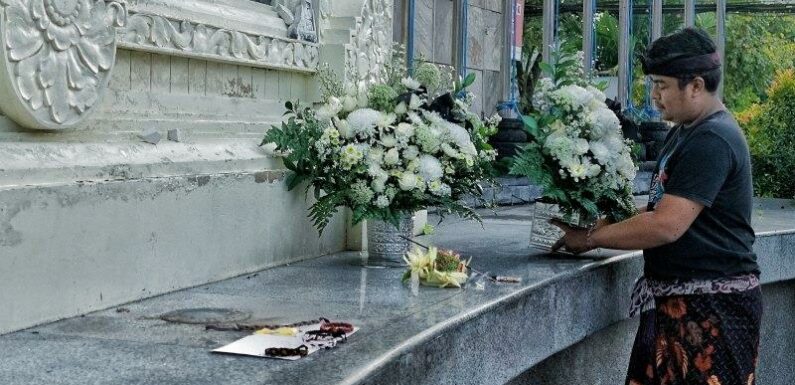
“It certainly became our identity for a long time.”
The awful event in Bali’s nightclub strip that Brad McIlroy of Perth’s Kingsley Football Club is referring to in that sentence happened 20 years ago today. He was 19 years old and holidaying with 19 teammates in Bali, and partying at the Sari Club in Kuta when the second and largest of three bombs, hidden inside a van, detonated in the crowded street outside. Between them, these attacks killed 202 people, 88 of them Australians, seven of those players for Kingsley.
The events of that night destroyed lives and tore apart families in Indonesia, Australia and around the world. They irrevocably shaped the identities of those left behind as survivors or bereaved. But it can also be said that for a time they changed how Australians saw Bali, Indonesia and the wider region, bringing the threat of terrorism to what had been a land of adventure. They changed how Indonesia saw itself, bringing a reckoning with Islamist militancy that was there at the start of its nationhood and which, through many ups and downs, continues to this day.
Looking back, we can see that at a moment when so much was lost, it mattered that people stood up for what remained. Ric Smith, then Australia’s ambassador in Jakarta, stood in the path of a bulldozer at the devastated Sari Club to insist on more time for police examination of the site; Made Mangku Pastika, then chief of Bali’s police force, stood on a table at Kuta’s Kartika Plaza Hotel to tell the hastily assembled foreign police that any investigation must be led by Indonesians; and Haji Agus Bambang Priyanto, a local civil servant, stood in the ruins evacuating the living that night and collecting the remains of the dead every day for a month afterwards.
In an interview with the ABC on Sunday, Smith said Australia’s relationship with Indonesia was made up of many threads, but the thread formed in tragedy 20 years ago “remains strong”. One of the reasons for that is the conduct of those Australians involved in leading the response. Just days later, then prime minister John Howard urged us to “wrap our arms not only around our fellow Australians but … around the people of Indonesia, of Bali”.
Senior officers Mick Keelty and Graham Ashton ensured that the joint investigation between Indonesian and Australian police forces known as Operation Alliance became a model for co-operation between nations, both in law enforcement and more widely.
Made Bagus Aryadana places a flower bouquet at the Bali bombing monument for his late father. Credit:Amilia Rosa
None of this should be allowed to obscure the bitter legacy of the bombings for so many people. As The Age’s coverage has shown, after 20 years Australians and Indonesians are still dealing with their grief and anger at the crimes committed by Jemaah Islamiyah. But our coverage has also shown that young Indonesians such as “Dinda” Laksono and Made Bagus Aryadana, who were infants when their parents were murdered, will not allow terrorism to define their lives.
In a poem he recited in Bali on the 10th anniversary of the bombings in 2012, Made vowed to his slain father “that my waiting will end here, I will seek the future you lost”. They were courageous words from the mouth of a child, but he has honoured that promise.
It is up to us to honour the memories of those Australians taken from us so cruelly and prematurely by making sure we reach out to those in distress here and abroad, seeking greater mutual understanding and co-operation in the future. Should that become our identity, we will truly have triumphed over all the schemes and the atrocities of terrorists.
Michael Bachelard sends an exclusive newsletter to subscribers each week. Sign up to receive his Note from the Editor.
Most Viewed in National
From our partners
Source: Read Full Article
